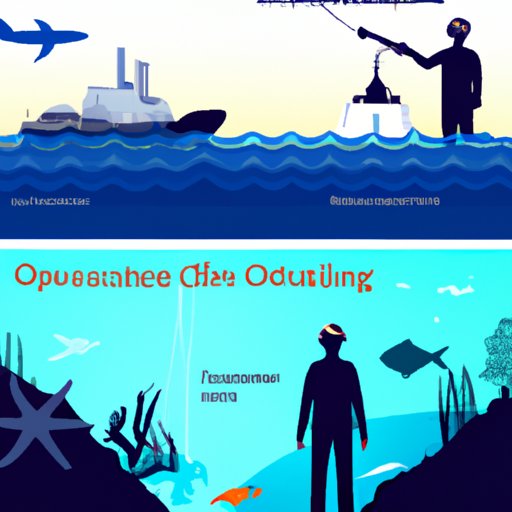Introduction
Marine science is a broad field of study that covers a range of topics related to the ocean. It encompasses many different disciplines, from biology and chemistry to physics and geology. It also includes social sciences, such as economics and law, which are important for understanding how human activities affect the ocean. Marine science is vital for understanding and protecting our oceans, which are essential to life on Earth.
Definition of Marine Science
The National Oceanic and Atmospheric Administration (NOAA) defines marine science as “the study of the physical, chemical, geological and biological processes that occur in the world’s oceans and coastal zones.” This definition captures the wide scope of marine science, which can include anything from studying the behavior of marine mammals to understanding the impact of climate change on ocean ecosystems.
Areas of Study
Marine science is divided into four main areas of study: biological oceanography, chemical oceanography, physical oceanography and geological oceanography.
Biological Oceanography
Biological oceanography focuses on the study of marine organisms and their interactions with their environment. It includes studies of the physiology, behavior and ecology of marine organisms, as well as their evolution and diversity. This field also looks at how human activities, such as fishing and pollution, can affect marine life.
Chemical Oceanography
Chemical oceanography studies the composition and properties of the ocean, including its salt content, temperature, pH, and other factors. It also looks at how these chemical properties affect ocean life and the global climate.
Physical Oceanography
Physical oceanography examines the physical processes of the ocean, such as waves, currents, and tides. It also looks at how these forces interact with each other and how they influence ocean life and climate.
Geological Oceanography
Geological oceanography focuses on the study of the structure and history of the ocean floor. It looks at how the ocean floor has evolved over time and how it has been shaped by geological processes. This field also examines how the ocean floor affects ocean circulation and climate.

Benefits of Studying Marine Science
Marine science provides a wealth of knowledge that can be used to understand and protect our oceans. Studying marine science can help us better understand the complex interconnections between marine life, their environment, and human activities. It can also provide insights into how we can conserve and sustainably manage our oceans.

The Role of Marine Science in Conservation and Sustainability
Marine science plays an important role in conservation and sustainability efforts. For example, marine scientists use their knowledge to monitor ocean health and identify potential threats to marine ecosystems. They can also use their expertise to understand the impacts of climate change on the ocean and develop strategies to mitigate those impacts.
How Marine Science is Used to Monitor Ocean Health
Marine scientists use a variety of tools and techniques to measure and monitor ocean health. These tools include satellite imagery, acoustic monitoring, and sampling of water, sediment, and organisms. By using these methods, researchers can track changes in ocean temperature, salinity, and acidity, as well as changes in the abundance and distribution of marine species. This information can then be used to identify potential threats to marine ecosystems, such as overfishing or pollution, and develop strategies to address them.
Understanding Climate Change
Climate change is one of the biggest threats facing the planet today. Marine scientists use their knowledge of the ocean to understand how climate change is impacting ocean ecosystems and what can be done to reduce its effects. For example, research conducted by the Scripps Institution of Oceanography found that ocean acidification, caused by increased levels of carbon dioxide in the atmosphere, is having a major impact on coral reefs. This research has helped inform policies to reduce carbon emissions and protect coral reefs.
Protecting Endangered Species
Marine scientists also play an important role in protecting endangered species. By studying the behavior and habitat of endangered species, researchers can develop strategies to protect them. For example, a recent study by the University of California, Santa Barbara found that certain types of ship traffic can have a negative impact on the endangered blue whale population. This research has helped inform policies to reduce ship traffic in areas where blue whales are known to congregate.
Career Opportunities in Marine Science
Marine science offers a variety of career opportunities for those interested in protecting and preserving our oceans. These include research scientists, educators, policy makers, and more. Research scientists conduct research on marine ecosystems, organisms, and processes. Educators teach about marine science and ocean conservation. Policy makers work to create and implement laws and regulations that protect marine life and habitats.

Examining the Challenges Facing Marine Scientists Today
Marine scientists face a number of challenges today. One of the biggest is limited resources. Funding for marine science research is often scarce, making it difficult for researchers to carry out their work. Additionally, environmental pollution is a major threat to marine ecosystems. Pollution from sources such as sewage, oil spills, and agricultural runoff can have devastating effects on ocean life. Finally, climate change is another challenge facing marine scientists. As the climate continues to warm, it will have profound impacts on ocean ecosystems and the creatures that live there.
Conclusion
Marine science is an important field of study that helps us understand and protect our oceans. It covers a wide range of topics, from biology and chemistry to physics and geology. Marine science is also vital for understanding and responding to the impacts of climate change on our oceans. Finally, there are a variety of career opportunities in marine science for those who are passionate about protecting and preserving our oceans.
(Note: Is this article not meeting your expectations? Do you have knowledge or insights to share? Unlock new opportunities and expand your reach by joining our authors team. Click Registration to join us and share your expertise with our readers.)
